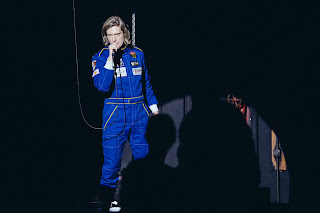Notably the fact that Agamemnon's death was itself a revenge killing: As Clytemnestra reminds us when she's finally allowed to speak (possibly the only time in the production that anyone expresses any relatable emotion,) Agamemnon sacrificed their eldest daughter Iphigenia to the gods at the start of the Trojan War, and a mother's vengeance isn't to be denied.
But the fact that the queen has also hooked up with her brother-in-law means Elektra is convinced that's the real motivation for the killing, and is determined Clytemnestra and Aegisthus should die in turn. The instrument is meant to be her long-lost brother Orestes (Patrick Vaill,) reports of whose death have been greatly exaggerated, and who's now on his way back.
For me Fish's production, which uses an Anne Carson translation, is built entirely around its soundscape (sound design by Max & Ben Ringham* and music by Ted Hearne.) Larson uses microphones both to amplify her voice and to create discordant noise to express her anger and grief; she also has a tendency to let sentences tail off into song. The Chorus (Hannah Bristow, Wallis Currie-Wood, Jo Goldsmith-Eteson, Nardia Ruth, Rebecca Thorn & Adeola Yemitan) also communicate almost entirely in song, so there's a feel of the visually very modern production harking right back to theatre's roots in religious ritual.
Those visuals tend very much towards the abstract: The main elements of Jeremy Herbert's bare-looking set are a revolve, and a white backdrop that rises and falls. In fact by far the biggest visual coup is the moment when what appears to be a projection turns out to be an ink-gun shooting a line onto the backdrop when Larson steps in front of it and gets stained (maybe I'm overestimating it as a coup de théâtre but I immediately started thinking about the choreography of getting revolve, ink gun, backdrop and actor all lined up at the right moment.) Elsewhere the visuals add to the occasional sense of humour, like when Vaill arrives dressed as a Formula 1 driver to deliver the fake news of his own death in a chariot race (in the style of a sports commentator.) Don't ask me what the blimp was meant to be about though.
The sound is what the show's built on though, down to Elektra using her control of it to push her own version of the story - like when she uses the amplification to drown out Marième Diouf as her less combative sister Chrysothemis. With her tendency to throw herself on the floor and shout/sing "NOOOOO!" at anyone who tries to offer a counter-argument, the study of furious grief comes a bit too close to turning into a toddler's tantrum. As for telling a story I'm not sure it does that either: When I see a play I know well and think the storytelling's off it's always useful to talk to someone who's less familiar with it, and conveniently I'd brought along my goddaughter, who didn't know this play and had a passing knowledge of ancient Greek theatre in general. She got the gist of the story from the production, pieced some more of it together from knowing other parts of the saga, and said she enjoyed it without quite being able to define what she'd just seen.
Hopefully that's the response a lot of people will have and not be put off by the deliberate obscurity, but I am left a bit unsure what the show's trying to achieve: Star casting of course brings in new audiences, but to then deliver a production that leaves a lot of gaps for anyone who doesn't already know the story and the tropes the show is twisting and riffing on, does leave me wondering who exactly this is aimed at. After all, I thought those new audiences were meant to be sold on coming back to the theatre, not alienated by obscure allusions to stories and conventions they're not familiar with.
Elektra by Sophocles in a version by Anne Carson is booking until the 12th of April at the Duke of York's Theatre.
Running time: 1 hour 20 minutes straight through.
Photo credit: Helen Murray.
*really, credited that way round? It'll be Dec and Ant next






No comments:
Post a Comment